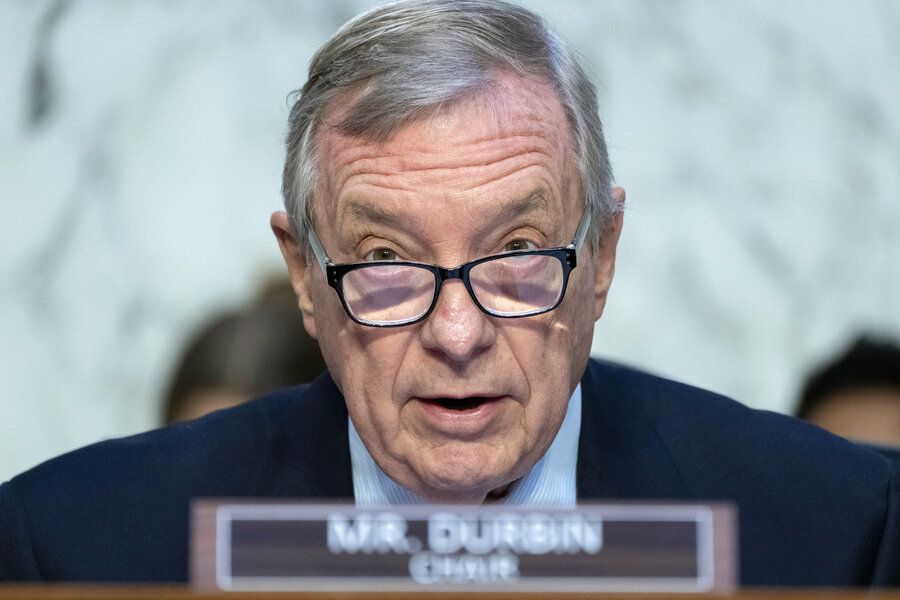After the Jan. 6 Capitol riot one year ago, current or former members of the U.S. armed forces ultimately accounted for 1 in 10 of those charged in the attack. In its wake, military officials have been setting a plan to battle extremism in the ranks.
The Pentagon’s new plan, released in December, bans advocating a violent overthrow of America’s government and prohibits essentially any show of support for racist groups, such as donating money or time to them. Troops are barred from actively demonstrating in support of extremist activities.
Why We Wrote This
Americans who have served in the military are sometimes put on a pedestal when it comes to patriotism. Yet the armed services are finding they need to confront serious challenges of extremist thinking.
While welcoming this new clarity, defense analysts say big questions remain about whether the new measures can be successfully put in place or go far enough. The outstanding needs, they say, range from better civics education and mental health services to tamping down notions of people with military credentials as a superior class in society.
“In some respects this reflects a lot of trust unit commanders to basically be implementers of this policy,” says Andrew Mines, a research fellow at George Washington University’s Program on Extremism. Yet, he adds, “any sane person looking at this sees that Jan. 6 is clearly prohibited.”
As the Pentagon was reeling from the Jan. 6 Capitol riot one year ago – with current or former members of the U.S. armed forces ultimately accounting for 1 in 10 of those charged in the attack – military officials began putting together a plan to battle extremism in the ranks.
They decided the first order of business should be to define some terms for their troops.
Long before the storming of the Capitol, the Department of Defense prohibited “active advocacy” of “supremacist, extremist, or criminal gang doctrine, ideology, or causes.”
Why We Wrote This
Americans who have served in the military are sometimes put on a pedestal when it comes to patriotism. Yet the armed services are finding they need to confront serious challenges of extremist thinking.
But it turns out that service members may have been unsure what, exactly, “active participation” or even “extremist activities” meant, senior defense officials said. It’s a claim that contains some measure of wishful thinking, critics countered, as if a simple restating of the rules could set errant troops straight.
Still, officials averred, the stunning events of Jan. 6 “demonstrated a need to clarify” matters.
The Pentagon’s new plan, released in December, does this, and also puts a finer point on what activities are prohibited for U.S. troops who support white supremacy. Newly banned actions include, among other things, “liking” racist content and social media posts advocating a violent overthrow of America’s government.
While welcoming this added clarity, defense analysts say big questions remain about whether the new measures go far enough and can be successfully put in place. The outstanding needs, they say, range from better civics education and mental health services to tamping down notions of people with military credentials as a superior class in society.
A key challenge, they add, will now rest with officers in the ranks, who are being tasked with making the new rules operative.
“In some respects this reflects a lot of trust unit commanders to basically be implementers of this policy. But there are some serious conflicts of interest here,” says Andrew Mines, a research fellow at George Washington University’s Program on Extremism. Yet, he adds, “any sane person looking at this sees that Jan. 6 is clearly prohibited.”
New rules for troops
The new guidelines prohibit essentially any show of support for racist groups, including donating money, time, or training to them. Troops are also barred from “actively demonstrating or rallying in support of extremist activities,” said a senior U.S. defense official, speaking on condition of anonymity during a background briefing for reporters.
In the online realm, “we went from having absolutely no policy on social media rules” to making some, the official noted.
One thing the Pentagon doesn’t ban is membership in extremist groups, including the white supremacist Ku Klux Klan or the paramilitary Oath Keepers, whose members have been charged with helping organize the storming of the Capitol building. These groups recruit service members for the perceived street credibility, as well as equipment, they might bring with them.
“It was really important to us that we preserve First Amendment rights to the extent we could, and that we focus on an individual’s action, regardless of whether they did that on their own or as part of an organization,” the defense official said. “[Yet] you’ll see that any way that someone could sort of actively become a member of an extremist organization, we’ve accounted for those. So we don’t think that there is any way for someone to be a member of an extremist organization in any meaningful way.”
Mr. Mines, at George Washington University, says banning membership in extremist groups would amount to playing “whack-a-mole” with organizations that routinely change their names. The FBI doesn’t maintain a list of domestic extremist groups, either.
Still, “would you want to occupy a foxhole with a guy who’s a member of the KKK, even though he can’t march with the KKK? No, I would not,” says retired Maj. Gen. Paul Eaton, who commanded the mission to train Iraqi troops early in the war and rejects the Pentagon’s First Amendment arguments in this case.

Manuel Balce Ceneta/AP/File
Members of the Oath Keepers on the East Front of the U.S. Capitol on Jan. 6, 2021, in Washington. Members of the group, which recruits people connected to the armed services for their perceived street credibility, have been charged with helping organize the storming of the Capitol building.
“You surrender a whole lot of civil rights when you elect to come into the armed forces, and when you accept the oath” of enlistment, in which troops swear to defend the U.S. Constitution against all enemies, foreign and domestic, he adds. “The argument that [troops] have freedom of speech – well, not really.”
Mr. Eaton decided to make a public plea for the military to get a better handle on extremism in its ranks in part, he says, after 124 other retired U.S. generals “put out a letter that basically bought into the Republican attack on the validity of the election, and also put in doubt President Biden’s capacity to serve as the president of the U.S.”
Appalled, he teamed up with two co-authors, also retired generals, to publish an opinion piece in The Washington Post. Above all, they wanted to warn their fellow Americans, he says, that “what used to be an article of faith – that any threat to the U.S. is going to come from outside the U.S. – is no longer true.”
They urged, among other things, better civics education. “No service member should say they didn’t understand whom to take orders from during a worst-case scenario,” they wrote.
The Pentagon report concurred with this assessment and proposed beefing up discussion surrounding the oath that personnel take. It said officials should also examine “the role of mental and behavioral health in extremist activities.”
A key role for unit commanders
Looking forward, enforcement looms as a difficulty – partly because defense officials have made clear that addressing rule-breakers shouldn’t be centralized at the Pentagon.
“Commanders will have to make that call on their own in terms of what they believe is the right thing to do,” Pentagon spokesperson John Kirby said. “That’s not something that the department would dictate at this level. And not everything has to be punished, either.”
Depending on where commanders’ sympathies or ambitions lie, this approach could prove problematic, defense analysts say, since reports of racist behavior, particularly if pervasive, have the potential to reflect badly on unit leadership.
“If I’m a unit commander and I don’t think the Proud Boys are that bad, then I’m not going to report anything,” Mr. Mines says. He adds that the “we trust our unit commanders” ethos will tend to emphasize nonpunitive disciplinary measures as an initial response.
The Pentagon, for its part, would get beefed-up offices to field whistleblower complaints under the new plan. What it doesn’t have is any means to police the social media accounts of individual service members. And “that’s not the intent,” Mr. Kirby said.
But maybe it should be, Mr. Eaton and his co-authors suggest: “The goal should be to identify, isolate and remove potential mutineers” and “guard against efforts by propagandists who use misinformation to subvert the chain of command.” The new measures “don’t go nearly far enough to address a developing problem.”
What allows extremism to take root?
The good news in all this, Pentagon officials have taken pains to emphasize, is that extremist threats within the forces appear to be relatively small. Of some 2.2 million active-duty personnel and reservists, roughly 100 of them were found to have taken part in extremist activities in 2021, according to Pentagon officials.
The numbers represent an increase over 2020, when that figure was “in the low double digits,” Mr. Kirby said.
This could portend an increase in extremist behavior or simply be a sign that reporting is getting a bit better – the latter being the Pentagon’s preferred explanation. In either case, tackling the problem requires understanding how some veterans develop grievances and become radicalized, says Scott Cooper, a Marine Corps veteran for whom the 1995 Oklahoma City bombing was a seminal event.
“Some of that rhetoric that [bomber and Army vet Timothy McVeigh] consumed is now becoming mainstream,” Mr. Cooper, now a senior fellow at the Atlantic Council, said last month during a Brookings Institution discussion on extremism in the military. “When it becomes patriotic to be against your government, there’s a problem there.”
For the vast majority of veterans, “If you think about it, joining the military is one of the great acts of trust. You’re trusting that your country will use your life well,” he said. “And yet what we have right now is a number in the veteran community that have been duped into believing other conspiracy theories that have come to really resonate with them.”
Understanding why, he added, involves acknowledging that Americans promiscuously place veterans on a pedestal. This elevated status may be giving some vets the idea that they, more than others, know what’s best for the country.
This is not the case, Mr. Cooper said – a conviction that reminded him of a letter that Gen. Jonathan Wainwright, a former prisoner of war and later commander of the 4th Army, sent his troops as many of them were being discharged after World War II.
Mingled with Wainwright’s praise was a hint of warning: “You have seen what happens when [people] follow false leaders. You have seen what happens when a nation accepts hate and intolerance. … Make your individual voices heard, not for selfish things, but for honor and decency among men, for the rights of al l people.”
Mr. Cooper’s conclusion: “Yes, I served eight tours overseas, seven of them in combat. But my sister who teaches elementary school back in Wyoming I think has done more for our community and our country than I ever have done. And I think it’s important that as veterans we don’t try to put ourselves above the rest of society.”
In the effort to avoid U.S. military troops’ involvement in any sort of repeat of the Jan. 6 insurrection, analysts say, that may be the most important lesson of all.
Note: This article have been indexed to our site. We do not claim legitimacy, ownership or copyright of any of the content above. To see the article at original source Click Here













